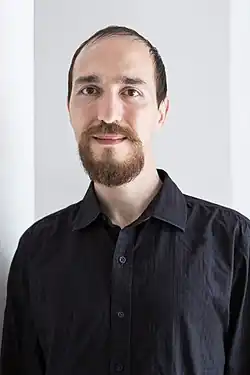Digital Media Concepts/Yucef Merhi
Yucef Merhi (born 1977) is a Venezuelan artist and a pioneer in the video game industry best known for using the Atari 2600, a video game console, in his artwork for the first time in 1985. A lot of his artworks are interactive and use concepts like poetry and virtual reality. Some of his artworks have been featured in museums in New York, Los Angeles, Amsterdam, Berlin, and Seoul, and he is also a researcher who studies the techniques in using art for improving sustainability.[1][2][3]

Early life and education
Merhi was born in Caracas, Venezuela.[1] At age seven, he utilized the Atari video game console to create forms of artwork that involved poetry and interaction.[3] Later, he earned a Master’s degree from New York University in Interactive Telecommunications.[4] Merhi has held a research fellow position at the Open Documentary Lab of the Massachusetts Institute of Technology.[2]
Artworks and their intended impacts
Quetzalcoatl 2.0.1.2. (2012)
The digital artwork Quetzalcoatl 2.0.1.2. by Merhi in 2012 was featured at the Los Angeles County Museum of Art. It provides an interactive experience to the audience as it consists of both audio and visual elements. The work attempts to make a connection between the past and the present, specifically between the Mesoamerican god Quetzalcoatl and modern society. This is accomplished by blending ancient symbols with live updates, such as tweets, news, and the stock market.[5]
The “No Fly List”
The “No Fly List” is a list managed by the government of the United States which prohibits certain individuals from taking commercial flights due to the possible security threats they pose. However, the list is not free of errors and there are cases of individuals that have been falsely identified as a national threat since they have similar names as those on the “No Fly List.” In his digital artwork, Merhi shows the flaws of the “No Fly List” by including the list’s errors and the comments of passengers who have been negatively affected by the “No Fly List.” Additionally, the artwork installation displays the fact that government officials were not very quick to correct the inaccuracies of the “No Fly List” since the errors did not immediately have a negative effect on them.[3]
Artwork themes
Many of Yucef Merhi’s artworks focus on displaying information that is otherwise hidden or unknown to the public. This includes looking into digital files and emails of corporations, public entities, and political figures such as Hugo Chávez, who served as the president of Venezuela. This is accomplished in order for the audience to understand how society is always changing over time.[3]
According to Merhi, he considers the truthfulness in many aspects of society when creating artworks, from the things that are happening individually to the events that are happening worldwide.[3]
“Retrocycling” research (OpenDocLab)
Yucef Merhi created the term “retrocycling” when he was doing research at the Open Documentary Lab on potential ways in decreasing technological waste. The term “retrocycling” in this context refers to the concept of taking electronics that are being replaced by ones that are much more advanced, and using artistic techniques in transforming the ones that are considered outdated for different purposes that make them still useful in modern society. According to Merhi, he still recognizes the technologies that had an impact on society even though they may no longer be relevant today.[2][3]
Awards
| Year | Award |
|---|---|
| 2019 | The Cisneros Fontanals Art Foundation (CIFO) Grant[6] |
| 2019 | Ellies Creator Award[4][7] |
| 2023 | Ellies Creator Award[7] |
References
- 1 2 "Yucef Merhi | International Documentary Association". www.documentary.org. Retrieved 2025-03-19.
- 1 2 3 "Yucef Merhi | Fellow". MIT Open Documentary Lab. Retrieved 2025-03-19.
- 1 2 3 4 5 6 "From Atari to the No Fly List, artist Yucef Merhi uncovers the pervasive power of technology". The Art Newspaper - International art news and events. 2021-09-01. Retrieved 2025-03-19.
- 1 2 "Yucef Merhi | New York University - Academia.edu". nyu.academia.edu. Retrieved 2025-03-19.
- ↑ "Yucef Mehri Response | LACMA". www.lacma.org. 2022-01-13. Retrieved 2025-03-19.
- ↑ "December 6, 2018 | CIFO Announces The Recipients Of The 2019 Grants & Commissions Program Award and Partnership With El Museo del Barrio". Retrieved 2025-03-19.
- 1 2 "Yucef Merhi". Oolite Arts. Retrieved 2025-03-19.